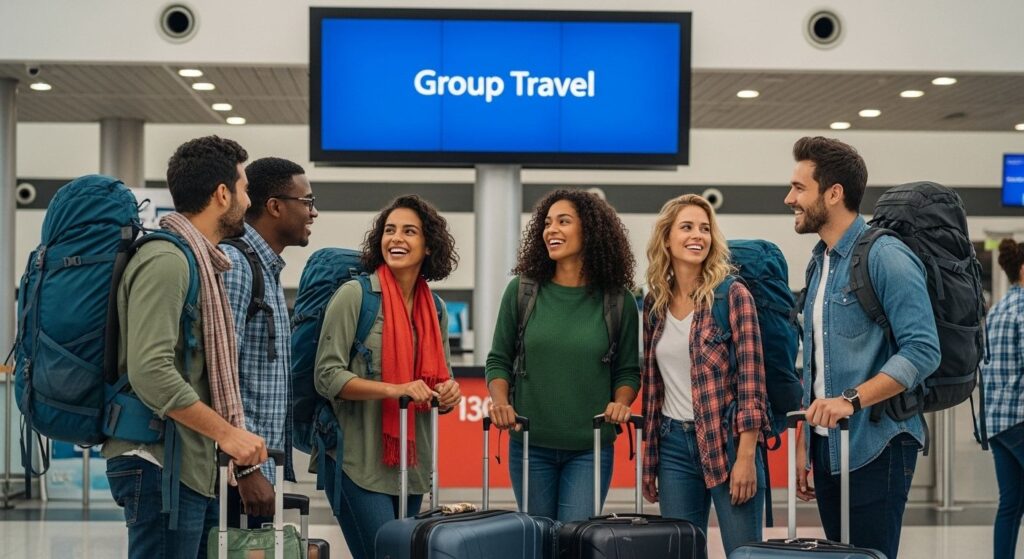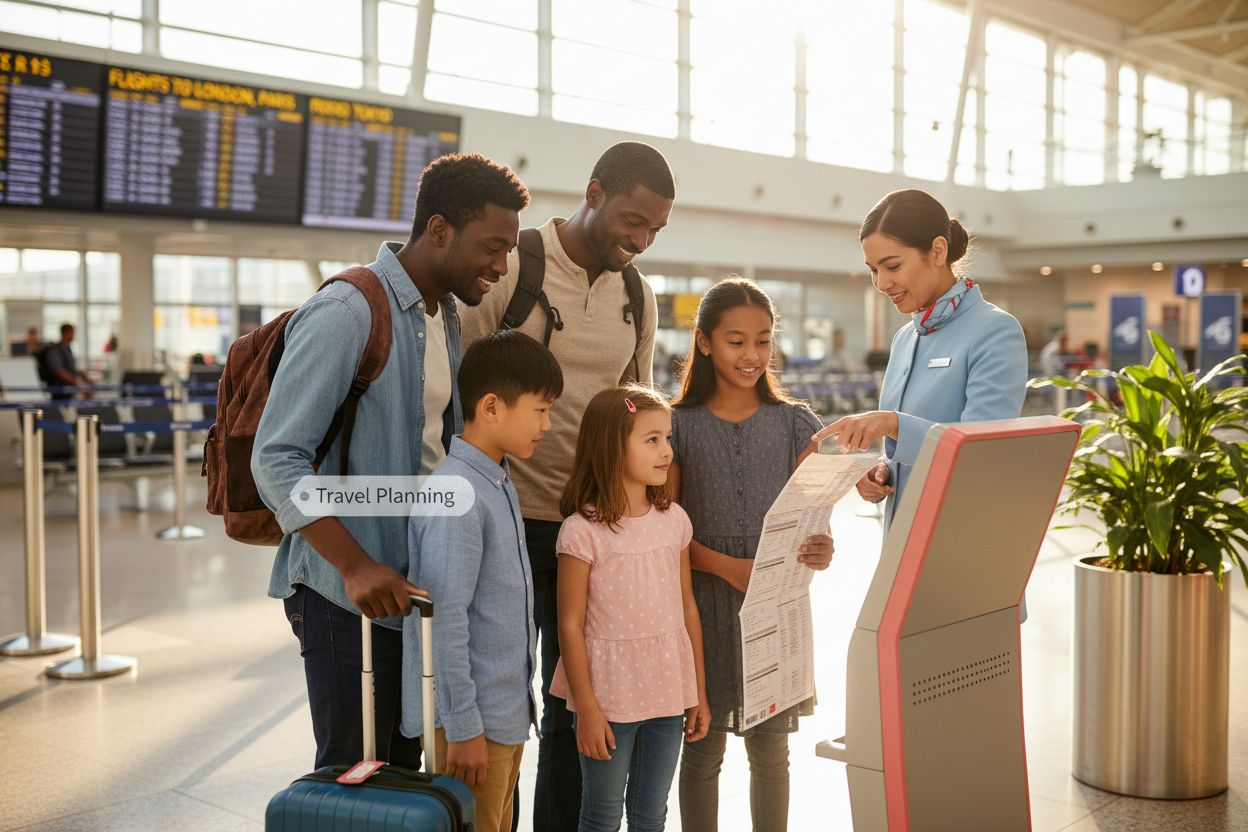Group travel is more popular than ever, with over 40% of Americans preferring to travel with others instead of going solo. Most people think it is all about crowded buses and matching T-shirts. That could not be further from the truth. Because the real secret is that group travel opens doors to deep friendships, big savings, and stress-free adventures that you will not find when traveling alone.
Table of Contents
- Defining Group Travel For Beginners
- Benefits Of Group Travel In The US
- Types Of Group Travel Experiences
- When To Choose Group Travel Or Go Solo
Quick Summary
| Takeaway | Explanation |
|---|---|
| Group travel fosters social connections | Traveling in groups enhances opportunities to meet new people and form lasting relationships, enriching the travel experience. |
| Group travel offers financial advantages | Discounts for group bookings and shared costs significantly lower individual travel expenses, making trips more affordable. |
| Choose structured travel for convenience | Organized group trips simplify planning with professional logistics, allowing travelers to focus on enjoyment rather than details. |
| Consider personal goals when choosing travel style | Reflecting on travel objectives helps determine if group or solo travel fits your preferences and desired experience. |
| Hybrid models merge group and solo benefits | Many travelers opt for a mix of guided tours and independent exploration to enjoy both structure and personal freedom in their journeys. |
Defining Group Travel for Beginners
Group travel represents a unique and exciting way to explore the world, bringing together individuals who share a common travel experience. Unlike solo or independent travel, group travel involves multiple people journeying together with shared transportation, accommodations, and often planned activities.
What Exactly Is Group Travel?
At its core, group travel is a collaborative travel experience where participants move together as a collective unit. According to research from the National Institutes of Health, group travel is characterized by organized movement involving a collection of individuals typically connected through a common purpose or organization. This could include school trips, senior citizen tours, religious pilgrimages, cultural exchange programs, or professionally organized travel packages.
Group travel can range from small intimate groups of 5-10 people to larger assemblages of 20 or more travelers. These groups might be formed through various channels like professional tour operators, educational institutions, social clubs, or special interest communities. The key distinguishing factor is the collective nature of the travel experience, where participants share significant portions of their journey.
Benefits of Choosing Group Travel
Traveling in a group offers numerous advantages that individual travel cannot replicate. Social interaction becomes a primary benefit, allowing travelers to meet new people, share experiences, and create lasting connections. Groups provide a sense of security, especially for those who might feel uncomfortable navigating unfamiliar destinations alone.
Financial advantages also make group travel attractive. Many tour operators and travel agencies offer discounted rates for group bookings, which can significantly reduce individual travel expenses. Shared transportation, group accommodation rates, and bundled activity packages often translate to substantial cost savings.
Additionally, group travel simplifies logistical challenges. Professional tour managers handle complex planning details like transportation coordination, accommodation arrangements, and activity scheduling. This reduces individual stress and allows travelers to focus on enjoying their experience. For those wanting to learn more about streamlining travel planning, understanding group travel dynamics can be incredibly beneficial.
Whether you’re a student seeking cultural immersion, a retiree wanting to explore new destinations, or a professional looking for a structured travel experience, group travel offers a compelling alternative to traditional solo journeys. It combines convenience, social opportunities, and often more affordable travel options into one comprehensive package.
Benefits of Group Travel in the US
Group travel in the United States offers a multifaceted approach to exploring destinations, providing unique advantages that extend far beyond traditional solo or independent travel experiences. Understanding these benefits can help travelers make informed decisions about their next adventure.
Enhanced Social Connections and Personal Growth
Social interaction becomes a transformative element in group travel. Research from Washington State University suggests that individuals who travel regularly report being approximately 7% happier than those who travel infrequently. Group travel amplifies this happiness by creating opportunities for meaningful connections with fellow travelers.
Travelers often discover unexpected friendships and professional networks during group journeys. Shared experiences like navigating new cities, participating in group activities, or overcoming travel challenges can create strong bonds among participants. These connections transcend typical social interactions, offering a platform for cultural exchange, personal learning, and mutual support.

Health and Wellness Benefits
Research published in the National Library of Medicine highlights significant health advantages associated with group travel, particularly for seniors. Travel can contribute to positive aging by enhancing both physical and mental well-being. Group travel structures provide built-in support systems, making exploration more accessible and comfortable for individuals who might feel hesitant about traveling alone.
Physical activities integrated into group travel experiences promote movement, reduce sedentary behaviors, and encourage participants to step out of their comfort zones. Whether it’s walking tours, group hiking adventures, or cultural exploration activities, these shared experiences contribute to overall health and fitness.
Practical Advantages and Cost Efficiency
Road Scholar’s insights underscore the practical benefits of group travel, including stress-free planning and access to local insights. Group travel often provides economic advantages through collective booking rates, shared transportation, and bundled activity packages. These cost-saving strategies make travel more accessible and affordable for many Americans.
Professionally organized group trips eliminate complex planning challenges. Tour managers handle intricate logistics like transportation coordination, accommodation arrangements, and activity scheduling. For travelers looking to streamline their vacation planning, group travel represents an efficient solution that minimizes individual stress and maximizes enjoyment.
Moreover, group travel offers unique access to experiences that might be challenging or less appealing for solo travelers. Professional guides provide deep cultural insights, historical context, and local knowledge that enrich the travel experience. These curated experiences transform a simple trip into an educational and immersive journey.
Whether you’re a retiree seeking new adventures, a professional looking for structured travel, or someone wanting to expand social horizons, group travel in the US presents a compelling and rewarding approach to exploration. It combines convenience, social opportunities, and structured experiences into a comprehensive travel package that caters to diverse traveler needs and preferences.
Types of Group Travel Experiences
Group travel encompasses a diverse range of experiences that cater to different interests, ages, and travel objectives. According to scholarly research, group travel can be structured or unstructured, with variations that meet multiple traveler needs and preferences.
Structured Group Travel Experiences
Structured group travel represents the most organized form of collective journeys. These experiences are typically pre-planned, with detailed itineraries, professional tour managers, and comprehensive travel arrangements. Professional tour packages often include educational, leisure, and cultural exploration opportunities.
Research from travel behavior studies identifies several key categories of structured group travel:
- Educational Group Tours: Academic trips for students, research groups, and learning-focused travelers
- Professional Conference Groups: Business-oriented travel for industry events and networking
- Cultural Exchange Programs: Organized trips focusing on international understanding and cultural immersion
- Senior Citizen Travel Groups: Specialized tours designed for older adults with tailored activities and support
Specialized Group Travel Categories
Beyond traditional structured experiences, group travel extends to more niche and personalized categories. These specialized groups often form around shared interests, professional affiliations, or specific travel goals.
Religious pilgrimages, hobby-based travel groups (like photography tours or culinary exploration trips), and special interest communities represent unique group travel experiences. These journeys connect individuals through common passions, creating deeper and more meaningful travel connections.
Adventure travel groups offer another exciting dimension. These might include hiking expeditions, wildlife photography tours, or extreme sports group trips. Such experiences attract travelers seeking more intense and interactive travel encounters. For travelers looking to customize their travel planning, understanding these specialized group travel options can unlock extraordinary experiences.
Informal and Social Group Travel
Not all group travel requires professional organization. Informal group experiences like family reunions, friend group vacations, and social club trips represent significant portions of group travel. These journeys are often self-organized, with participants sharing planning responsibilities and travel costs.
Social media and online platforms have revolutionized informal group travel, making it easier for like-minded individuals to connect and plan collective trips. Alumni groups, professional networks, and special interest communities now leverage digital tools to coordinate complex group travel experiences.
The flexibility of these informal groups allows for more spontaneous and personalized travel arrangements. Participants can adapt itineraries based on group preferences, creating unique and memorable collective experiences that differ from traditional tour packages.
Whether you prefer highly structured professional tours or more relaxed social group adventures, the world of group travel offers something for every type of traveler. The key is finding an experience that matches your travel style, interests, and comfort level. Understanding these diverse group travel options empowers travelers to make informed decisions and create unforgettable shared journeys.
Here’s a summary table outlining the main types of group travel experiences described in the article, along with examples:
| Type of Group Travel | Description | Examples |
|---|---|---|
| Structured Group Travel | Professionally organized trips with set itineraries | Educational tours, senior travel groups |
| Specialized Group Travel | Focused on shared interests or affiliations | Religious pilgrimages, hobby groups |
| Adventure Group Travel | Activities focusing on exploration or outdoor experiences | Hiking expeditions, photography tours |
| Informal & Social Group Travel | Self-organized by friends or family with flexible planning | Family reunions, friend vacations |
| Digital & Community-Driven Social Groups | Organized via online platforms or social networks | Alumni groups, special interest clubs |
This table categorizes the various group travel formats discussed, helping readers quickly identify which style may suit their preferences.

When to Choose Group Travel or Go Solo
Deciding between group travel and solo adventures depends on multiple factors, including personal preferences, travel goals, and individual comfort levels. Research from the International Journal of Environmental Research and Public Health reveals that psychological motivations play a crucial role in travel choices, with each approach offering unique benefits and challenges.
Evaluating Personal Travel Goals
Understanding your primary travel objectives is the first step in determining whether group or solo travel suits you best. Personal growth and travel motivations vary significantly between these two travel styles. Research on American tourist preferences indicates that travelers choose between group and solo experiences based on specific destination characteristics and personal comfort levels.
Group travel often appeals to individuals seeking:
- Structured experiences with minimal planning stress
- Social connections and shared memories
- Built-in safety networks in unfamiliar destinations
- Guided cultural and historical insights
Solo travel attracts travelers who prioritize:
- Complete itinerary flexibility
- Personal growth and independent exploration
- Deeper immersion in local cultures
- Spontaneous decision-making
Situational Considerations for Travel Style
Certain destinations and travel scenarios naturally lend themselves to group or solo experiences. Complex or challenging locations might benefit from group travel’s support structure. Remote or less-developed regions often feel more navigable with organized tour groups that provide local expertise and logistical support.
For travelers with limited experience in international travel, planning your next adventure becomes easier with group travel’s comprehensive support. Professional tour managers handle transportation, accommodations, and activity scheduling, reducing individual stress and potential complications.
Conversely, seasoned travelers might prefer solo journeys that allow for spontaneous detours, deeper cultural interactions, and personal challenge. The ability to modify plans instantly and engage directly with local communities becomes a significant advantage for independent travelers.
Hybrid Travel Approaches
Modern travel increasingly embraces hybrid approaches that combine elements of group and solo experiences. Many travelers now mix structured group tours with independent exploration periods. This strategy allows individuals to benefit from professional guidance while maintaining personal travel autonomy.
Technology has further blurred traditional travel boundaries. Online platforms enable travelers to join partial group experiences, connect with local guides, or find travel companions for specific segments of their journey. These flexible options provide unprecedented travel customization.
Ultimately, the choice between group and solo travel is deeply personal. Some travelers might prefer different approaches depending on the destination, their current life stage, or specific trip objectives. The key is understanding your own travel style, comfort level, and what you hope to gain from the experience.
Whether you choose the camaraderie of group travel or the independence of solo exploration, each approach offers unique opportunities for discovery, personal growth, and memorable experiences. The most important factor is selecting a travel style that aligns with your individual preferences and allows you to fully enjoy your journey.
Below is a comparison table that highlights the key differences between group travel and solo travel based on the article’s discussion. This can help readers decide which option best matches their travel goals:
| Feature/Preference | Group Travel | Solo Travel |
|---|---|---|
| Planning Responsibility | Managed by tour leaders/professionals | Entirely on the traveler |
| Social Interaction | High; opportunities to meet new people | Limited; more independent |
| Flexibility | Lower; follows set itinerary | High; full control over plans |
| Safety/Support | Built-in safety and support systems | Self-reliant |
| Cost Efficiency | Shared/group discounts, lower per person | Usually higher individual costs |
| Access to Local Insights | Guides provide context and local info | Dependent on individual’s research |
| Ideal For | Convenience, social connection seekers | Independence, spontaneous explorers |
This table makes it easy to compare the main elements of group and solo travel, as detailed in the article.
Frequently Asked Questions
What is group travel?
Group travel is a collaborative travel experience where multiple people journey together, typically involving shared transportation, accommodations, and planned activities. It can range from small intimate groups to larger gatherings.
What are the benefits of group travel?
Group travel offers several advantages including enhanced social connections, cost savings through group discounts, simplified travel planning with professional logistics, and opportunities for shared experiences and personal growth.
How does group travel improve social connections?
Group travel provides opportunities to meet new people, share experiences, and form lasting friendships. Shared activities and challenges during the journey foster stronger bonds among participants.
When is it better to choose group travel over solo travel?
Choosing group travel is ideal when seeking structured experiences, social interactions, built-in safety networks, or if you prefer to minimize planning stress. Solo travel might be better for those who value flexibility, independent exploration, and spontaneous decision-making.
Ready to Experience Stress-Free Group Travel Planning?
You learned in this guide that group travel is all about smooth coordination, shared adventure, and making real connections. Yet, the biggest challenge is keeping everyone organized and making plans that suit each person. Managing bookings, collecting everyone’s confirmations, and customizing every detail can quickly become overwhelming and exhausting.

Stop letting complicated spreadsheets and endless back-and-forth ruin your excitement. With Yopki, you get an all-in-one travel app that takes away the stress of planning for your entire group. Instantly generate a personalized itinerary that fits your group’s interests. Change up your plans with a simple drag-and-drop and see your days laid out visually on a smart map. Use your AI Travel Concierge to get instant answers and let us handle booking your tickets and reservations. Take the next step to a happier trip by exploring how Yopki makes group travel easier and more fun—start planning today.



